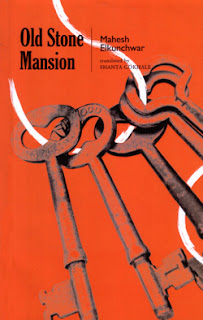Old Stone Mansion – Mahesh Elkunchwar.
Plot
Overview-
The play, Wada
Chirebandi, begins on the fifth day after the demise of Tatyaji (Venkatesh) the
patriarch of the Deshpande family of Dharangaon. Dharangaon is a small hamlet
in the interiors of Maharashtra
where the influences of commercial Bombay has slowly spread its tentacles. The
play begins with Aai, the widow of Tatyaji, awaiting the arrival of her second
son Sudhir and his wife Anjali from Bombay, to attend the 13th day rites. In
the meantime, the eldest son Bhaskar and his wife, Vahini, has taken over the
reins of the family by taking charge of the two objects of command, the keys
and the ancestral jewellery box. Been a traditional Brahmin family, Bhaskar
intends to conduct the rituals in full traditional fanfare even when the family
has fallen in difficult lines.
Bhaskar expects Sudhir to bear the expenses, as his image of someone from a big
city is that of been financially well off, while Sudhir claims that he is just
about making ends meet in his two room apartment in the outskirts of Bombay.
Thus the first crack in the already crumbling household begin. Ranju &
Parag, the fourth generation, feels the need of escaping from their Wada as
they feel stifled in a time stuck place. The obvious destination is Bombay.The
split in the family widens when each start claiming their own. Ranju, with
cinema in her head feels her private tutor can be a vehicle to reach Bombay.
Parag, who has moved in wrong company, wants to change his ways in a faraway
land. Prabha the sister of Bhaskar and Sudhir wants to further her higher
studies as the fears she would end like other ladies in the Deshpande
household.All this leads to further complicacies which highlights the plight of
such traditional families which have stuck in time.
The play written in 1983 captures vividly the decline of the Wada culture in
Maharashtra, unable to stand the test of time and the social change in the
world beyond. 'Wada' which means an old, ancestral country house takes centre
stage in Wada Chirebandi, revealing the skeletons of a culture, stuck in time.
The Wada insularity is a product of the large joint family with its hierarchic
patriarchy that holds the tensions in check under a facile pretence of
authority.The crisis brought forth in this intense play is more than a family
crisis–it is a crisis of traditional culture against commercial or consumer
culture. As Elkunchwar says, “Wada is not a simple family drama, it is more
than that, a document of social change, political change .

Comments
Post a Comment